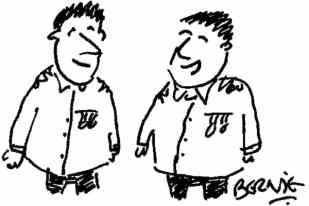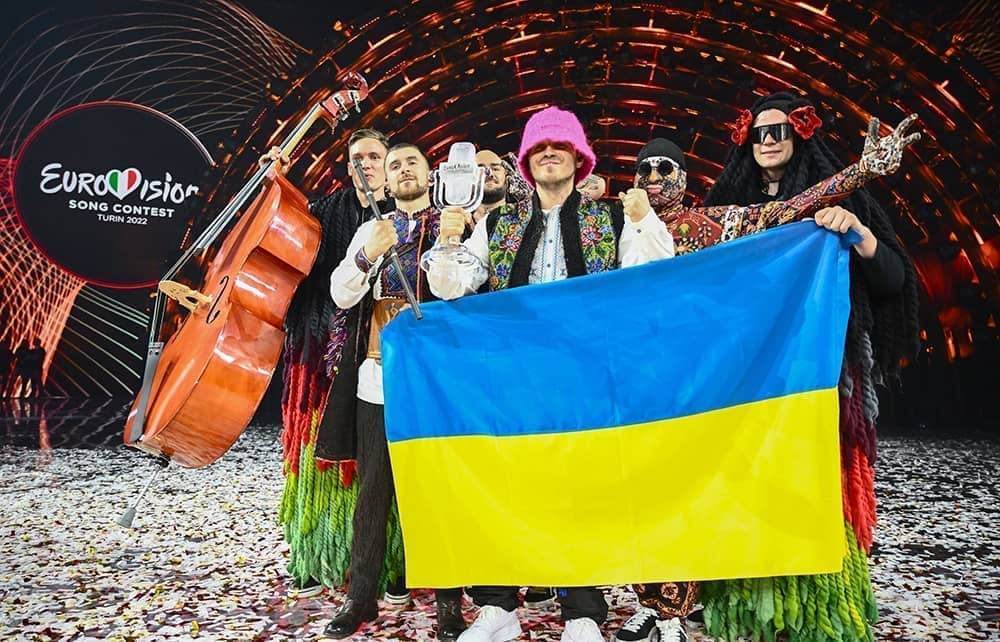Twice during the Eurovision Song Contest our television lost the signal and the set went blank – once, mercifully, during the performance of a hirsute, gurning, cod-operatic bellend from that patently European country Azerbaijan. ‘Putin’, my wife and I both reckoned, seeing as Russian hacker groups favourably disposed towards their country’s leader had promised that they would do what they could to disrupt the broadcast and indeed the voting.
If this really is the third world war, then I suppose it is a suitably banal and modernist take on universal annihilation – this yearly celebration of joyous gayness and very bad music suddenly part of the same war as the bloodshed, carnage and misery of Mariupol. And we, in the West, in our armchairs, with our bags of Doritos, keeping score on both counts: is it 30,000 Russian soldiers dead or 40,000 – and what have we done to the Greeks and the Australians that they wouldn’t give us a single point? The bizarre notion, too, of Putin actually watching this absurd extravaganza and cursing to himself like a cheap TV villain as the votes for Ukraine poured in.
And yet there are one or two correlations. Eurovision has been even more expansionist than Nato in recent years, the continent puffing itself up to include the former Soviet states of Georgia, Armenia, Azerbaijan, Ukraine, Estonia, Latvia, Lithuania, Moldova – and, when they are behaving themselves, Belarus. Not to mention, of course, Israel and Australia. And all those now independent countries once in the Warsaw Pact but now firmly part of western Europe and indeed Nato.

These are the other tanks parked by Putin’s back door, then, the culture tanks – Europe’s ATMOS 52-calibre howitzer blasting a fusillade of wokery and high camp towards Moscow and imploring: look, your former allies are all on board, why not join us? Initially tempted, the Russians did indeed get on board with the campery for a while and became quite good at it, winning the contest in 2008 with a truly godawful power ballad called ‘Believe’, produced by the Yankee rapper Timbaland. But they have since ceased to believe and we don’t believe in them any more, either. The Eurovision Song Contest represents a certain aspect of European culture which Putin – and many Russians – find grotesque. This has been Russia’s paradox for the best part of a thousand years: a yearning to be embraced by the West and a revulsion at the ‘softness’ and affected nature of western culture. Mind you, on the narrow point of Eurovision, I am not 100 per cent convinced that Vlad is entirely wrong.
The UK’s compère, Graham Norton, did not have a good night, being wrong almost every time he opened his mouth. Far from proving that the contest was not decided by political voting, petty neighbourly animosities and votes in favour of countries which are generally liked at the moment, this year’s broadcast confirmed that this was exactly the way the thing is always decided. Ukraine, with perhaps the tenth-best song in the contest, won by a mile.
There is no doubt that our own entry – Sam Ryder’s ‘Spaceman’ – was easily the most likeable and competent British contribution for a good 30 years and Sam himself seemed a cheery and delightful soul. But it seems to me that the UK’s gung-ho and steadfast support for Ukraine has not gone unnoticed beyond these shores and we are at last the recipients of a certain amount of goodwill from foreigners who more usually class us, with Germany and France, as imperialist bully-boys. And indeed, there at the bottom were Germany and France – France deservedly, Germany less so, I think. There was a huge public vote for Moldova too – presumably out of sympathy for them being next in line.
There was a huge public vote for Moldova too – presumably out of sympathy for them being next in line
The music now changes every year because the whole thing is taken much more seriously than before and so has become cannily reactive towards popular musical trends. The only typical ‘Eurovision’ song was Spain’s hackneyed, galumphing entry ‘SloMo’, sung by a Cuban woman, Chanel, who inadvertently or otherwise afforded lucky viewers a brief glimpse of her growler, so sheer was her attire. It did well, presumably among Eurovision traditionalists aghast that their usual schlock was in short supply.
Otherwise it was largely unaccompanied, winsome, whining young men showing us that they were very much in touch with their feelings, which is extremely au courant in pop these days. There were continual nods to the vague, woke, low-key, sparsely accompanied self-harming bedroom pop ballads performed by the likes of Billie Eilish, Clairo and Lana Del Rey. The best of them was the Swiss entry – Marius Bear’s lachrymose riposte to The Cure, ‘Boys Do Cry’; a subtly constructed melody that was, for me, the best Eurovision song since The Common Linnets’ ‘Calm After the Storm’ in 2014. But there were so many young men mewling ineffectually that I suspect it got lost in the morass.
In another nod to the prevailing pop fashion, rap did not figure prominently this year. Good. European rap is about as convincing as Georgian reggae or Nepalese grindcore. Ukraine’s winner retained a semblance of rap (it is popular there, as well as in Russia) but was rescued by a chorus of solemnity (as was only fitting). In truth, none of the songs were terribly good and only the UK’s, Sweden’s and Switzerland’s could bear the burden of being heard more than once. The Euro songwriters have learned to imitate the charts and they are across all the prevailing trends, but the songwriting still lacks authenticity. But then Eurovision was never really about authenticity, was it?
Did the Russians look at this extravaganza (if they were allowed to) and suddenly feel the scales falling from their eyes? ‘Look, everyone supports Ukraine… are we the bad guys?’ Maybe not, but if it cheered them up from Lviv to Odessa, then for once Eurovision was a force for good.







Comments